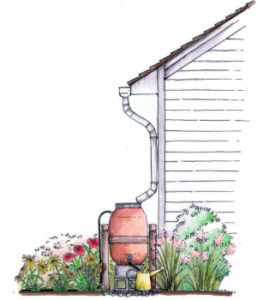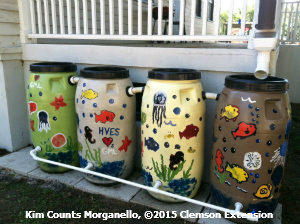Ellen Comeau
In the United States, rainwater harvesting is becoming more popular in residential yards due to the many benefits. It can protect our waterways by reducing the amount of stormwater runoff, the strain on local aquifers, and flooding risk. The practice can also help homeowners reduce their water bills, prevent erosion and moisture control issues, and protect their landscape by providing supplemental water in times of drought. You can use harvested rainwater for many things, including irrigation, equipment washing, and wildlife watering stations.
When considering a rain barrel, be aware that you will need to:
- Have a plan for how to use the collected rainwater.
- Place rain barrels as close to the area of use as possible.
- Select a rain barrel made of dark plastic to reduce algae growth.
- Ensure the rain barrel has a screen on top to prevent mosquitos from entering the barrel.
- Install all rain barrels on a level base and secure the barrel from tipping.
- A full rain barrel can weigh over 400lbs and pose a hazard if it falls.
With these points in mind, if you’d like to purchase a rain barrel, please consider supporting the Beaufort County Water Resources Agents’ and the Lowcountry Stormwater Partners Consortium’s rain barrel sale. They offer the 100% Recycled Ivy Rain Barrel at $70.00 each! You will be able to order your rain barrel today and schedule a pick-up time that works with your schedule. All pick-ups occur at the Clemson Extension Office (18 John Galt Rd. Beaufort, SC 29906). Find more information and order now while supplies last at www.RainBarrelProgram.org/lsp.
For more information about rainwater harvesting, check out the Rainwater Harvesting for Homeowners Manual, HGIC Factsheet #1728: Best Practices for Application of Harvested Rainwater on Edibles, and HGIC Factsheet #1729: Rainwater Harvesting Systems Guidance for Schoolyard Applications.
Clemson University Cooperative Extension Service offers its programs to people of all ages, regardless of race, color, gender, religion, national origin, disability, political beliefs, sexual orientation, gender identity, marital or family status and is an equal opportunity employer.




